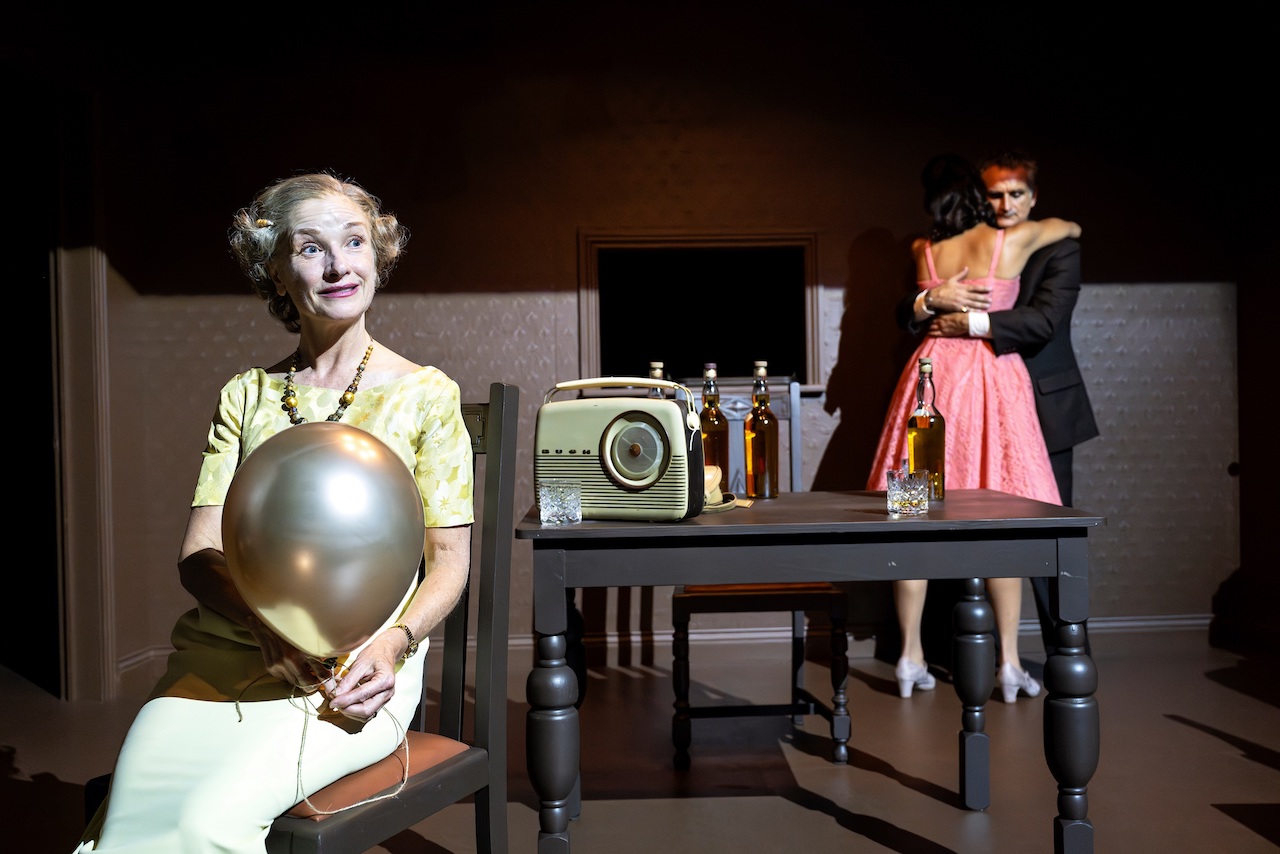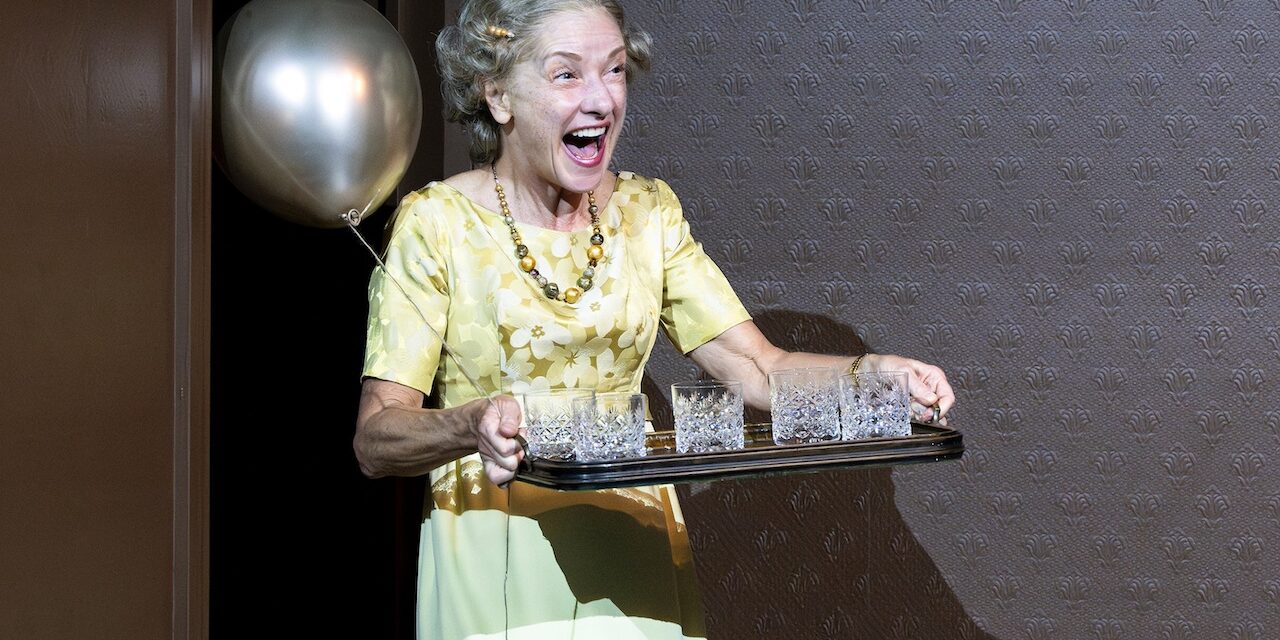
2 – 31 August
Deborah Warner’s tenure as Artistic Director of the Ustinov has consistently featured theatre of the highest quality, and this production of The Birthday Party is yet another triumph. Written in 1958 it was Harold Pinter’s second play, and was initially met with bemusement and rejection. Critics were baffled by those features which are now lauded as being ‘Pinteresque’, including dialogue full of digression, disjunction, repetition and long pauses. It also juxtaposes the stiflingly mundane with the frighteningly unpredictable, resulting in an intentionally discomfiting mixture of the ordinary and the surreal. Under the direction of Richard Jones, whose Machinal was so memorable here last year, all those features are given due weight.
The setting is a room in a boarding house, and mundane ordinariness is initially signalled with some cheerful seaside organ music. As an actor touring in rep in the 1950s Harold Pinter would have spent time in some grim digs, but surely none as unremittingly bleak as that which the set designer Ultz has created. First revealed from behind a window from which an occupant peers out at the world, the lights go up on a virtually featureless brown box, an empty blank canvas upon which events will play out which may or may not be real. That jolly organ music will later become disturbingly discordant.
The landlady of this dreary den is Meg Boles (Jane Horrocks), a naïvely optimistic woman, convinced that both her husband Petey (Nicolas Tennant) and her guest Stanley (Sam Swainsbury) will respond to her breakfast treat of fried bread with delight and surprise. Horrocks endows Meg with a wonderfully comic level of wishful thinking and enthusiasm for the humdrum that may be a shield against pain. When told of someone having a baby girl, she wistfully muses that she would always have much rather had a little boy, revealing a hint of emptiness and loss. The sole guest in her boarding house is Stanley, a moody and dishevelled young man who has been staying there for a year. Meg treats him as a surrogate son, even buying him a drum for his birthday, and he responds with childlike tantrums and sulks. His wildly erratic behaviour and the increasing unlikeliness that he has ever really been, as is claimed, a successful pianist, raises questions about just how much of this is genuine. Is Meg actually running a boarding house that features on ‘the list’ of recommended places, or is she fantasising? Husband Petey seems solid enough, but he is tellingly absent at his chess club when the action becomes most fantastical.
That action is the birthday party itself, imposed upon a very unwilling Stanley by Meg and her two new guests, the dark-suited Goldberg (John Marquez) and his side-kick McCann (Caolan Byrne). Goldberg is an intimidatingly assertive, fluent speaker, while McCann seems anxious and unsure of himself. It is all too clear that together they represent a serious threat to Stanley, though why that should be is never explained. With their formal courtesies and their insistence that Stanley’s birthday should be celebrated properly they appear to be injecting conventional normality into this somewhat odd setting, but if so they represent normality of a very dark kind indeed. Marquez is particularly effective in conveying the sense that Goldberg’s controlled formality is functioning as a pressure-cooker lid on his capacity for extreme violence. Stanley initially attempts to defy Goldberg and McCann, but they eventually break him. There are occasions in this production when the tone becomes a little uncertain, but the rapid-fire interrogation that Goldberg and McCann inflict upon Stanley is delivered masterfully and in a manner that is both bleakly comic and truly menacing – pure Pinter.
The only other guest at this bizarre party is Lulu, a flirtatious young neighbour who, like Meg, seems all to keen to accept situations at their face value. In a performance that brings considerable depth to this relatively brief role, Carla Harrison-Hodge hints at past damage. She becomes a victim again, at the hands of both the predatory Goldberg and the seriously unbalanced Stanley. Unspecified past damage is a recurring theme, even Goldberg momentarily loses his self-control, collapsing while recalling something unnamed but unbearable. In the morning after the party Stanley, now catatonic, is taken away by Goldberg and McCann, with Petey unable to stop them. He cries out, ‘Don’t let them tell you what do to!’ perhaps suggesting the play is Pinter’s cry against the norms of conventional theatre, or even against the hypocrisies of conventional morality. Who knows?
At the very end Meg remains blissfully unaware, recasting the dreadful events of the night as a delightful occasion when she was ‘belle of the ball’. But Meg has yet to learn that Stanley’s room is now empty, and we are left debating the many unanswered questions raised by this teasingly ambiguous play.
★★★★☆ Mike Whitton, 9 August 2024
Photo credit: Fonteini Christofilopoulou


